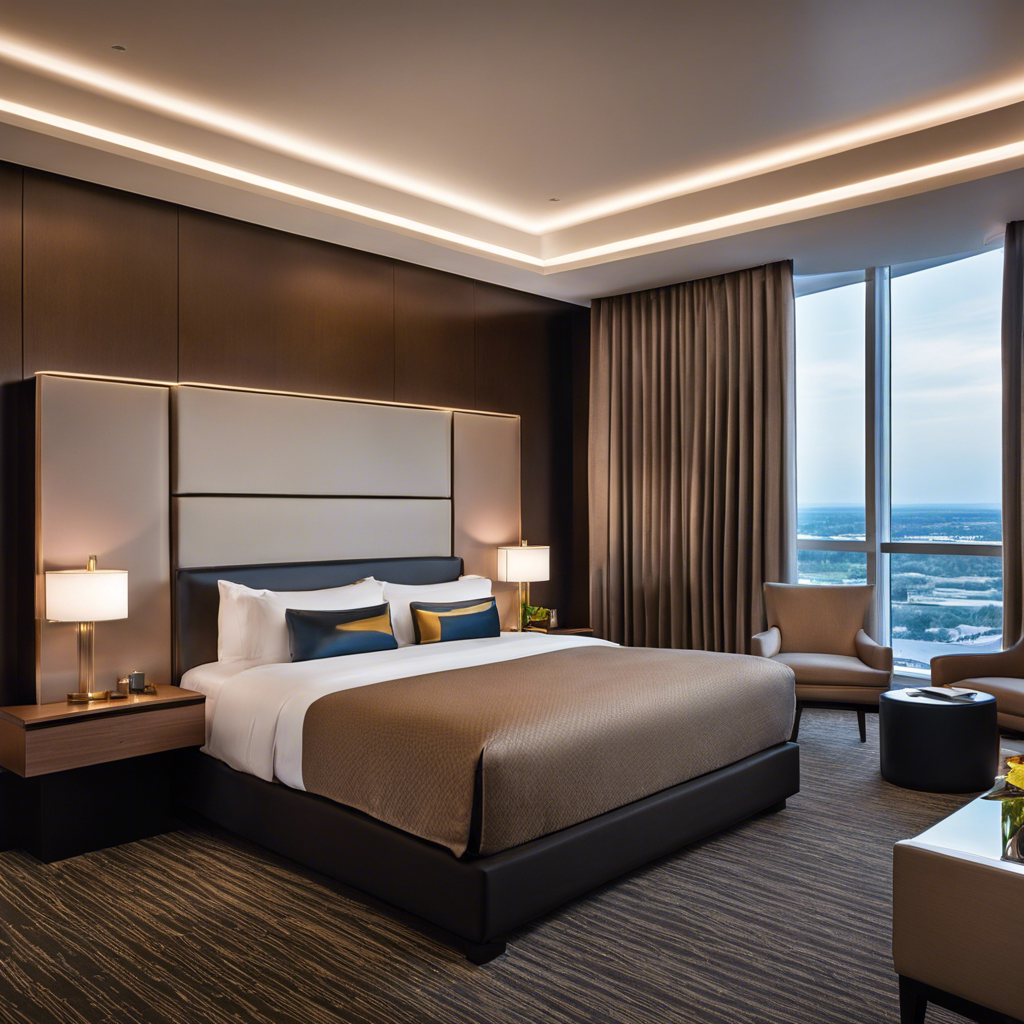Are your hotel’s HVAC systems running on empty, leaving your energy bills soaring like a hot air balloon?
It’s time to give your guests a breath of fresh air and optimize the efficiency of your heating, ventilation, and air conditioning.
In this discussion, we will explore practical strategies and industry-proven techniques to help you achieve optimal HVAC performance for Tulsa’s hotels.
From conducting thorough inspections to implementing smart controls, we will guide you through the maze of possibilities, leaving you with a cool sense of anticipation for what lies ahead.
Key Takeaways
- Conduct regular inspections and maintenance to ensure optimal performance and energy efficiency of HVAC systems in Tulsa’s hotels.
- Upgrade to energy-efficient equipment such as variable speed drives (VSDs) and high-efficiency models to reduce energy consumption and enhance guest comfort.
- Optimize temperature control settings by adjusting parameters based on specific requirements, utilizing programmable thermostats, and optimizing fan speed settings.
- Implement smart HVAC controls with IoT integration and advanced algorithms for real-time monitoring, data analysis, and optimized energy consumption in Tulsa’s hotels.
HVAC System Inspection
To ensure optimal performance and energy efficiency, it’s essential for Tulsa’s hotels to conduct regular HVAC system inspections. HVAC system maintenance plays a crucial role in extending the lifespan of the equipment and reducing energy consumption.
By inspecting the HVAC system, potential issues can be identified and addressed before they escalate into major problems. This includes checking for leaks in the ductwork, ensuring proper airflow, and verifying the functionality of all components. Regular inspections also allow for the cleaning and replacement of filters, which is crucial for maintaining good indoor air quality and preventing the buildup of dust and contaminants.
Additionally, energy-saving tips can be provided during inspections, such as adjusting thermostat settings, implementing programmable thermostats, and sealing any air leaks in the system. By conducting regular HVAC system inspections, Tulsa’s hotels can save on energy costs and provide a comfortable environment for their guests.
Regular Maintenance and Cleaning
Regular maintenance and cleaning of the HVAC system is crucial for ensuring optimal performance and energy efficiency in Tulsa’s hotels.
One important aspect of regular maintenance is filter replacement. Filters should be checked and replaced regularly to prevent dirt, dust, and debris from clogging the system. Clogged filters can restrict airflow and decrease the system’s efficiency.
Another crucial maintenance task is ductwork inspection. Over time, ductwork can accumulate dust, dirt, and even mold, which can hinder the airflow and affect indoor air quality. Regular inspection ensures that any leaks, blockages, or damages are identified and addressed promptly.
Cleaning the ductwork is also essential to remove any accumulated contaminants.
Upgrading to Energy-Efficient Equipment
Upgrading to energy-efficient equipment is a strategic investment that can significantly improve HVAC system performance and reduce energy consumption in Tulsa’s hotels. By implementing energy saving technology and optimizing the HVAC system design, hotels can achieve higher efficiency levels and lower operating costs.
One key aspect of upgrading to energy-efficient equipment is the installation of variable speed drives (VSDs) on HVAC motors. VSDs allow the motors to operate at different speeds based on the cooling or heating demand, resulting in reduced energy consumption.
Additionally, replacing older, inefficient HVAC units with high-efficiency models can greatly improve system performance and energy efficiency. These new units feature advanced technology, such as variable refrigerant flow (VRF) systems, which deliver precise temperature control and reduce energy waste.
Upgrading to energy-efficient equipment not only benefits the environment but also enhances guest comfort and satisfaction.
Optimizing Temperature Control Settings
In order to optimize temperature control settings, it’s important to carefully adjust the HVAC system parameters based on the specific requirements and usage patterns of Tulsa’s hotels. Implementing energy-saving strategies and utilizing HVAC automation tools can significantly improve efficiency and reduce energy consumption.
One key approach is to establish temperature setpoints that align with the comfort needs of guests while minimizing energy waste. By analyzing historical data and occupancy patterns, hotels can determine the ideal temperature ranges for different areas and adjust the HVAC system accordingly. Utilizing programmable thermostats and occupancy sensors can automate temperature adjustments based on occupancy levels, ensuring comfort when needed while conserving energy during low-demand periods.
Additionally, optimizing the HVAC system’s fan speed settings can contribute to energy savings. Adjusting fan speeds based on occupancy and outside temperature conditions allows for better airflow control and prevents unnecessary energy consumption.
Implementing Smart HVAC Controls
To enhance HVAC efficiency in Tulsa’s hotels, the implementation of smart HVAC controls is essential.
Smart HVAC controls utilize IoT integration and advanced algorithms to optimize energy consumption and improve overall system performance. These controls enable real-time monitoring and analysis of HVAC equipment, allowing hotel managers to identify inefficiencies and make data-driven decisions to reduce energy waste.
By integrating HVAC systems with IoT devices, such as sensors and thermostats, hotels can collect and analyze data on temperature, humidity, occupancy, and other factors that affect energy consumption. This data can be used to identify patterns and trends, enabling hotels to adjust temperature settings, optimize ventilation, and schedule equipment operation based on occupancy levels.
Frequently Asked Questions
How Much Does a Regular HVAC System Inspection Cost for Hotels in Tulsa?
Regular HVAC system inspections for hotels in Tulsa can vary in cost, depending on the size of the facility and the specific needs. It is crucial for hotel staff to prioritize maintenance to ensure optimal efficiency and guest comfort.
What Are the Common Maintenance Tasks That Hotel Staff Can Perform to Keep the HVAC System Running Efficiently?
To improve your hotel HVAC system efficiency, perform regular maintenance tasks like cleaning air filters, checking thermostat settings, and inspecting ductwork for leaks. These simple steps can help you save energy and ensure guest comfort.
Are There Any Government Incentives or Tax Credits Available for Hotels in Tulsa That Upgrade to Energy-Efficient HVAC Equipment?
There are government incentives and tax credits available for hotels in Tulsa that upgrade to energy-efficient HVAC equipment. These incentives and credits can help you save money and contribute to a more sustainable environment.
How Can Hotels Optimize Temperature Control Settings Without Compromising Guest Comfort?
Want to optimize temperature control settings without compromising guest comfort? Follow these energy-saving strategies. Adjust thermostat settings based on occupancy, install occupancy sensors, and use programmable thermostats. These measures ensure optimal comfort while saving energy and reducing costs.
What Are the Potential Cost Savings and Energy Efficiency Benefits of Implementing Smart HVAC Controls in Hotels?
Implementing smart HVAC controls in hotels can lead to significant cost savings and energy efficiency benefits. However, potential challenges may arise during the implementation process. To ensure success, hotels should follow best practices for HVAC energy management.


